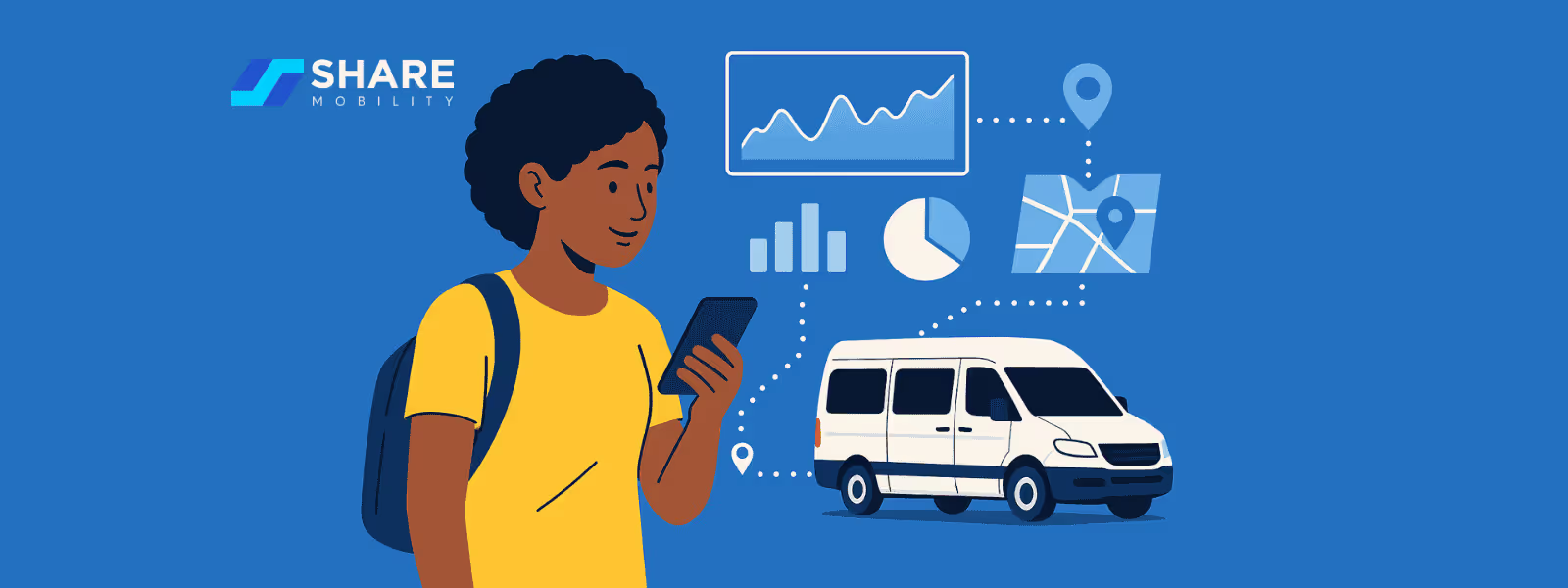How Partnerships Create Opportunities for Refugees and Beyond

Providers of commuter benefits are determined to attend to the needs of vulnerable groups of people and move people to work hassle-free. This creates an exceptional opportunity to partner with nonprofits; nonprofits look for jobs that are suitable for their clients (i.e. the employer provides adequate pay, health insurance, green card holders or those with prior convictions are eligible to work there, etc.) and then a nonprofit coordinator suggests employers who meet these requirements and provide Mobility-as-a-service (MaaS).
Safa Saleh is the Channel Partnership Manager at SHARE Mobility, and this exact relationship is her specialty. Here, she explains her unique understanding of refugees and vulnerable populations, including their strengths and challenges. She uses her niche knowledge to partner SHARE Mobility with nonprofits to create employment opportunities, set the foundations for partnerships, and most importantly, to get people to work.
Can you discuss what you do for SHARE Mobility as the Channel Partnership Manager?
Safa: As the Channel Partnership Manager, I work solely with nonprofits to connect them and their clients with local employers. Our process starts by meeting with the nonprofit organization with the goal of understanding their needs. Then, we reach out to new and existing employment partners to find opportunities for the nonprofit clients. Next, we set up a meeting between the nonprofit and local employers, so that the nonprofit can ask all the questions they need in order to determine if the employer is the right fit for the individuals they support who are seeking employment. If the nonprofit determines the employer is a good fit for the organization, then SHARE Mobility gets to work. To begin, SHARE Mobility designs routes for clients that are convenient, employing a dynamic system that accounts for weather, traffic, and other riders each day. The final most important step: picking up clients from a close-by optimal pick-up location in the community directly to the door of their place of employment.
In what ways have you seen nonprofit organizations have success in working with SHARE Mobility?
Safa: In order for nonprofits, clients, and employers to have a successful relationship, the client must be centered. Nonprofits work best when they can rest assured that their clients’ needs are met by the local employer they chose to partner with. It also is helpful if the client’s travel time to the employer is no further than an hour. When nonprofits partner with employers that have career coaches or multiple language proficiencies, many clients do extremely well. Of course, of utmost importance, is that the employer pays a fair wage and treats the employee with respect.
Can you talk about the barriers to finding jobs in regards to lack of transportation? How does this specifically affect refugees’ ability to get hired?
Safa: There are many transportation barriers when it comes to finding and keeping a job. These include lack of reliable income for car ownership and upkeep and the inability to obtain a driver license. What’s worse: many times employers will ask if a potential hire has reliable transportation, and the answer to this question can impact whether or not the person is hired. When discussing refugees specifically, we have to understand exactly where they are at when they arrive in the US; it is much more nuanced than just traveling from far away. There are several barriers that make it challenging for refugees to get to work consistently and on time.
1. Driver License: Refugees simply may not have documents needed when you apply, on top of transportation to get there and money to pay for the license itself.
2. Language: Translators are expensive, and many informational websites are not offered in a variety of languages, which can make it near impossible to understand the steps needed to obtain a driver license, let alone take a driver education course.
3. Income: Many times, when refugees first arrive in the U.S., finding a job is very difficult for the reasons listed above, and more. Especially because circumstances surrounding the need for refuge are often traumatic, many times refugees arrive with zero income. They are then forced to pay for a ride, use public transportation, or rely on a friend, which is unreliable at best.
4. Driving: Even if a refugee can drive, learning to drive in a new country without support can be extremely difficult.
5. Roads and Weather Conditions: This is another unknown that can drastically affect a person’s ability to learn to drive.
How does SHARE Mobility’s transportation solution benefit refugees?
Safa: SHARE Mobility is a free service to nonprofits, which makes opportunities with employers accessible. This allows refugees to acquire the career they deserve, not just a job. In this way, SHARE Mobility mitigates the effects of inflation, by making reliable transportation a no-cost issue for working families, car liability, because refugees have a dependable ride for their daily commute, weather conditions, and connects the client with the right employer that meets their economic needs.
Can you share any success stories or experiences you have had where you have seen a positive change as a result of SHARE Mobility providing transportation for refugees?
Safa: I have had a front row seat to the major challenges that nonprofits face to assist their clients, such as language barriers and transportation. Language and transportation are intertwined, which makes our software based service inherently user-friendly and accessible for all. When I explain to nonprofits that the SHARE rider and driver booking services provide languages as a tool or function, it is so meaningful. Ultimately, it means that refugees can access the ridebooking platform in their own language. This makes nonprofits feel confident in our ability to serve their clients, and makes the clients safe in our care. Anything we can integrate into our existing software or services in order to serve the client better, only means more success for SHARE Mobility as a whole.
How might refugee populations get connected to SHARE Mobility’s services?
Safa: In general, the public can be advocates for refugees by advocating for more commuter benefits services. Also, refugees or their support systems can advocate for themselves by reaching out to nonprofits for employment opportunities. On the other hand, nonprofits actively engaging in their communities will help lead refugees and anyone that is at-risk for transportation problems to successful careers. Ultimately, nonprofits must understand transportation needs, language needs, and the locations of their clients to make a meaningful impact. Ultimately, strong partnerships between SHARE Mobility and nonprofit organizations allows for commuter benefits to best serve populations who need a ride most.






